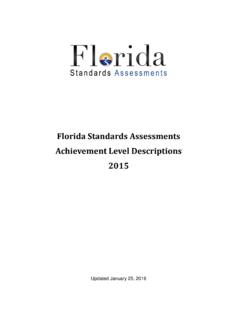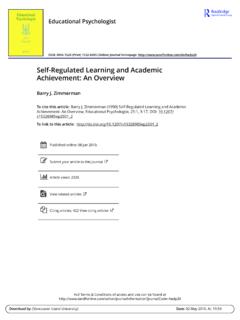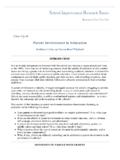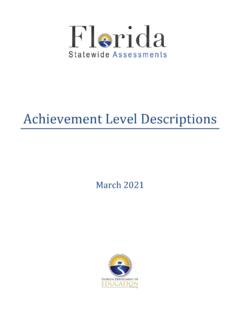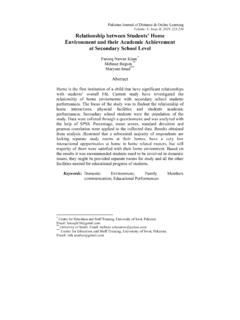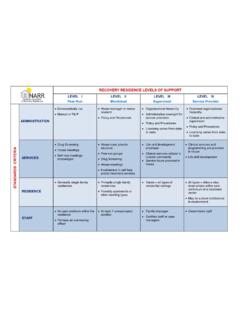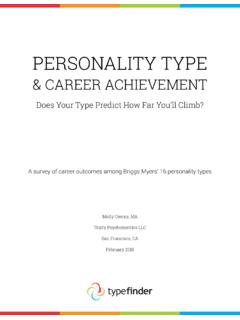Transcription of Parents’ Educational Levels Influence on Child Educational ...
1 Parents Educational Levels Influence on Child Educational Outcomes: Rapid Literature Review Clearinghouse Technical Assistance Team As of January 6, 2020 This material is the result of partnership funded by the Department of Defense between the Office of the Deputy Assistant Secretary of Defense for Military Community and Family Policy and the USDA s National Institute of Food and Agriculture through a grant/cooperative agreement with Penn State University Page 2 of 10 Clearinghouse for Military Family Readiness at Penn State Table of Contents Executive Summary .. 3 Introduction .. 3 Behavior and Child Development Theories .. 4 Parents Educational Levels Influence on Child Educational Outcomes .. 4 Background .. 4 Early to Middle Childhood .. 5 Middle Childhood.
2 6 Adolescence to Middle Adulthood .. 6 Military-connected Families .. 7 Conclusion .. 7 Additional Assistance .. 8 Suggested Citation .. 8 References .. 9 Page 3 of 10 Clearinghouse for Military Family Readiness at Penn State Executive Summary This rapid literature review was conducted in response to a request from the National Military Family Association. These findings address research related to how parents Educational Levels Influence their children s Educational outcomes. Child behavior is shaped by observation and direct learning experiences (Bandura as cited in Dubow, Boxer, & Huesmann, 2009). When parents model achievement -oriented behavior ( obtaining advanced degrees, reading, continuing education) and provide opportunities for their children to engage in achievement -oriented experiences ( library trips, museums, after-school programs), those children develop the belief that achievement -oriented behavior is valued and expected (Dubow et al.)
3 , 2009). Since children learn, in part, by observation, one of the key components to a Child s success is parental time investment (Kalil, Ryan, & Corey, 2012). Highly educated parents spend more time with their children (Guryan, Hurst, & Kearney, 2008) and spend that time actively developing their children s talents and skills (Lareau, 2002); whereas, less educated parents spend less time with their children (Guryan et al., 2008) and tend to let their children s talents and skills develop with little or no guidance or stimulus (Lareau, 2002). Additionally, high-income and highly educated parents are more likely to be involved in their Child s education (Cheadle & Amato, 2011), which is a key factor in adolescents Educational successes (Cabrera, Peralta, & Kurban, 2018).
4 This report provides the following elements: brief descriptions of relevant behavior and Child development theories; a synthesis of the literature; and brief descriptions of studies that demonstrate how parents Educational Levels Influence Child Educational outcomes at various points in time. Please note that this rapid literature review provides a preliminary examination of the research on outcomes related to parental education; however, it is not intended to serve as a comprehensive review of the literature. Introduction The Technical Assistance (TA) team at the Clearinghouse for Military Family Readiness at Penn State (Clearinghouse) conducted a brief, rapid literature review on the topic of how parents Educational Levels Influence Child Educational outcomes.
5 Research that examines Educational outcomes was identified by searching peer-reviewed journal articles, and an emphasis was placed on research published between 2009 and 2019. Search queries included various combinations of the following terms: parent(al) education (level), parent(al) expectations, parent(al) degree, military Page 4 of 10 Clearinghouse for Military Family Readiness at Penn State spouse education, (military) Child education, Child education outcomes, Child education attainment, and higher education. Behavior and Child Development Theories Numerous behavior and Child development theories exist that can help explain how parents Educational Levels Influence Child Educational outcomes. This rapid literature review identified the social learning theory, social cognitive ecological theory, development theory, and sociological theory as the most prevalent models cited in the literature.
6 Brief descriptions of each theory are provided below. Social learning theory: behavior is learned through observations and direct learning (Bandura as cited in Dubow et al., 2009). Social cognitive ecological theory: behavior is an accumulation of intrapersonal characteristics ( , IQ, aggression) and environmental factors ( , parent education, school, family interactions). These factors together shape cognitive styles ( , achievement -oriented, pessimistic) in adolescence, which predict adult outcomes (Dubow et al., 2009). Development theory: children need different types of parent investments during different developmental periods for optimal outcomes. Parent time investments include basic care, play, teaching, and management (Kalil et al.)
7 , 2012). Sociological theory: parents learn about social mobility and standards of success through education. This acquired knowledge, in turn, shapes their interactions and behaviors with their children (Kalil et al., 2012). Parents Educational Levels Influence on Child Educational Outcomes Background Parents Educational Levels positively Influence their children s immediate Educational outcomes and Educational and vocational achievements into middle adulthood (Dubow et al., 2009). Children learn by observing those around them and by direct experiences. Their behaviors are then shaped by these interactions (Bandura as cited in Dubow et al., 2009). Parental time investment in a young Child is one of the key predictors of a Child s success as an adult (Kalil et al.
8 , 2012). College-educated mothers spend more time providing Child care and age-appropriate activities with their children than mothers who have a high school education (Kalil et al., 2012). Generally, highly educated parents ( parents with more than 4 years of college experience) spend more time Page 5 of 10 Clearinghouse for Military Family Readiness at Penn State with their children than parents who have less Educational experience (Guryan et al., 2008). Since highly educated parents tend to view time with children as an investment opportunity to build human capital (Guryan et al., 2008), they spend that time actively developing their children s talents and skills; whereas, less educated parents tend to let their children s talents and skills develop with little or no guidance or stimulus (Lareau, 2002).
9 Additionally, high-income and highly educated parents are more likely to be involved in their children s education, which is a key factor in adolescents Educational successes (Cabrera et al., 2018). Parent- Child interactions lead to the development of beliefs or expectations for success that guide and maintain behavior over time (Frome & Eccles, 1998). When parents model achievement -oriented behavior ( obtaining advanced degrees, reading, continuing education) and provide opportunities for their children to engage in achievement -oriented experiences ( library trips, museums, after-school programs), those children develop the belief that achievement -oriented behavior is valued and expected (Dubow et al., 2009).
10 Such successes might include graduating from high school, exploring higher learning, and seeking out prestigious job opportunities. Parents with more years of education have high expectations for success for their children, actively encourage their children to develop their own high expectations for success (Davis-Kean, 2005), and are better at aligning expectations with their children s abilities than low-income or less educated parents (Alexander, Entwisle, & Bedinger, 1994). Parents abilities to set realistic expectations help them tailor the home environment to meet their children s needs, which can lead to higher grades and the pursuit of more education (Davis-Kean, 2005). Early to Middle Childhood Kalil et al. (2012) utilized data from the 2003 2007 American Time Use Surveys (ATUS) to determine if maternal education had any effect on the amount and type of time mothers spend with their children across age groups.
